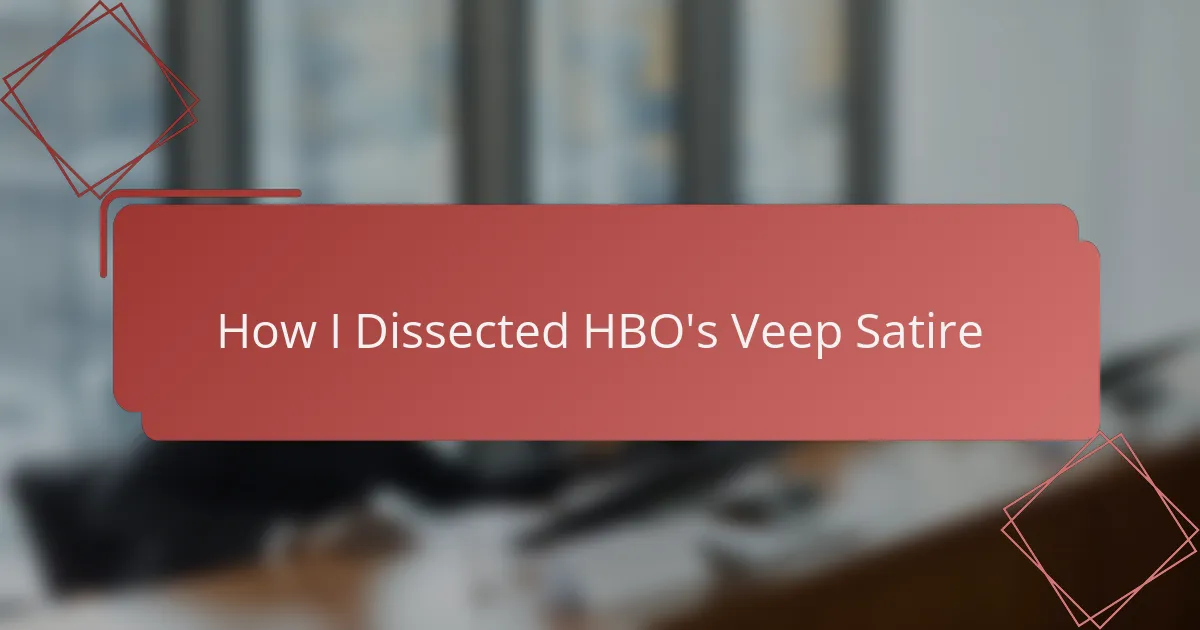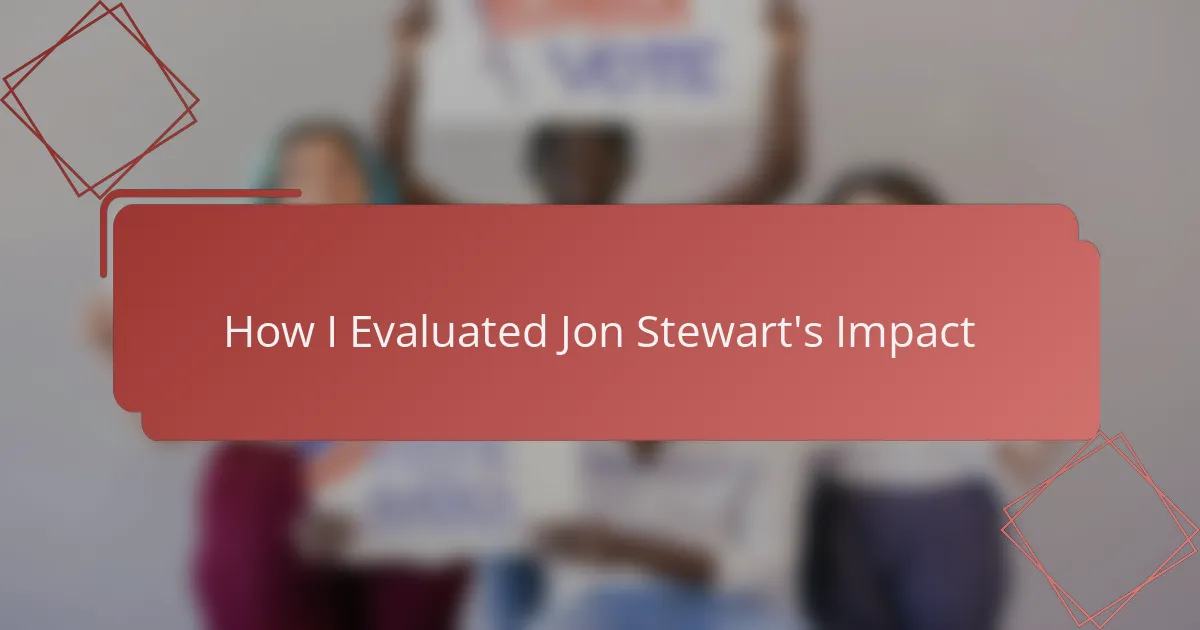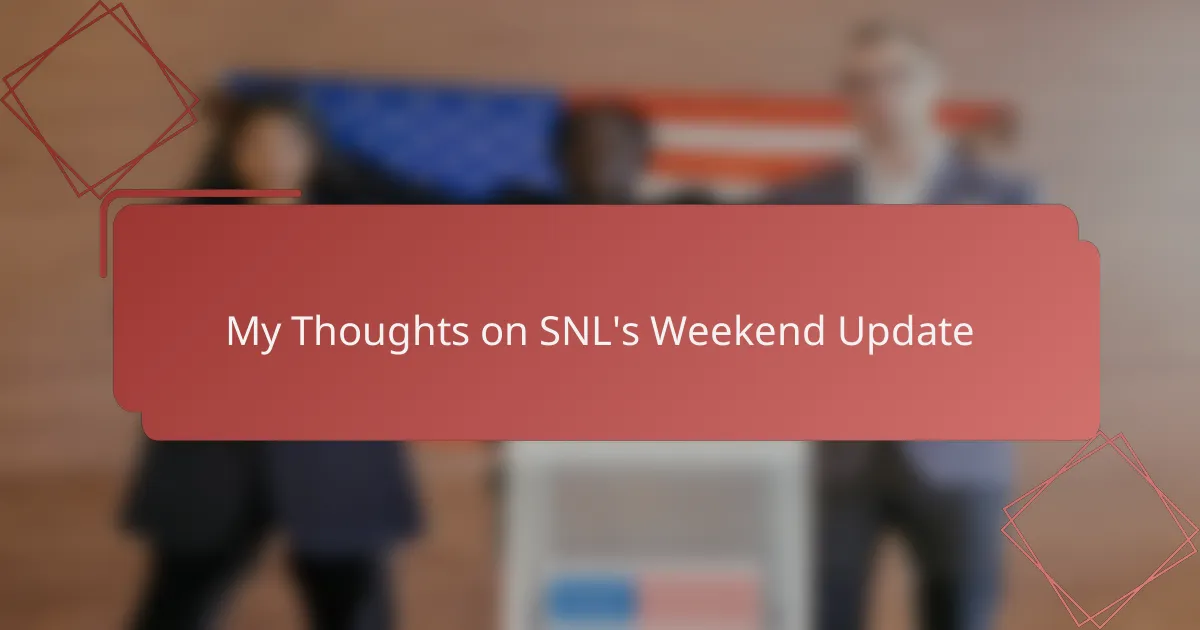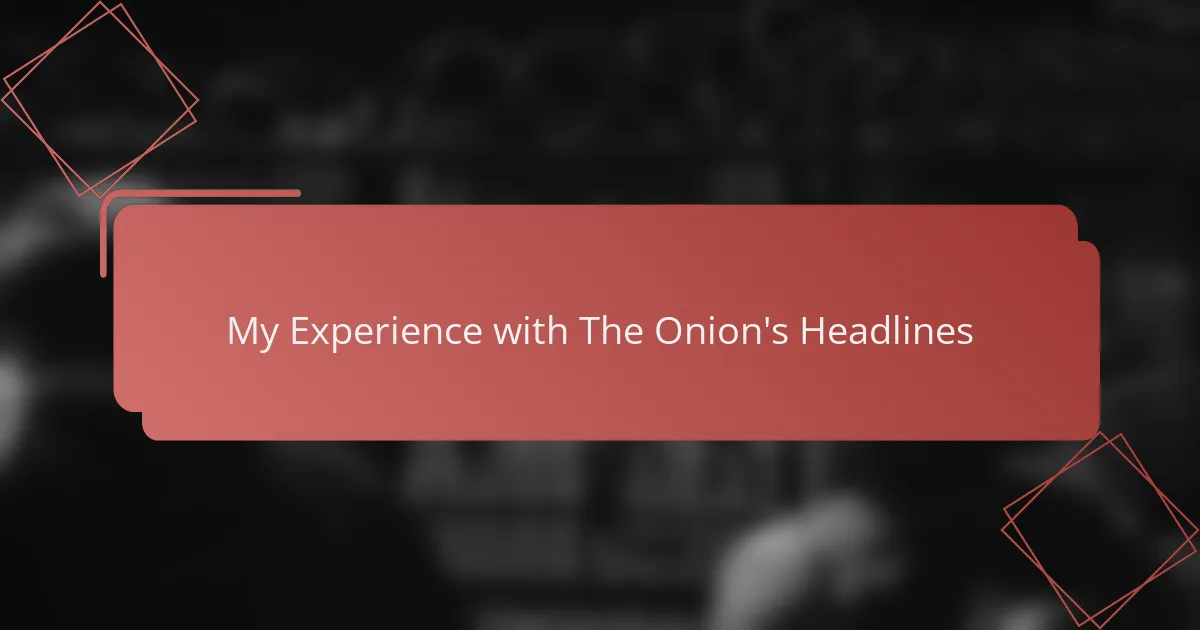Key takeaways
- Political satire blends humor with truth, using exaggeration to critique real-life political absurdities.
- HBO’s *Veep* employs fast-paced dialogue and exaggerated character flaws to highlight the chaotic nature of politics.
- The show explores themes like political ambition, power dynamics, and media manipulation, prompting viewers to reflect on governance and human nature.
- Analyzing satire involves connecting personal experiences to the material, enhancing the emotional impact and insight of the commentary.

Understanding Political Satire Basics
Political satire has always struck me as a clever mirror held up to society, reflecting our political realities with humor and sharp critique. When I first dove into dissecting Veep, I realized that grasping the basics of satire was crucial. It’s not just about making fun; it’s about blending truth with exaggeration to spotlight absurdities in politics.
I remember laughing out loud at Veep’s outrageous scenarios, only to pause and think, “Wait, that actually isn’t far from real life.” This balance between humor and meaningful commentary is what makes political satire so powerful and, frankly, captivating.
- Uses humor to expose and criticize political flaws
- Employs exaggeration and irony for effect
- Relies on real political contexts to resonate with audiences
- Encourages reflection on political power and behavior
- Often blends truth with creative storytelling for impact
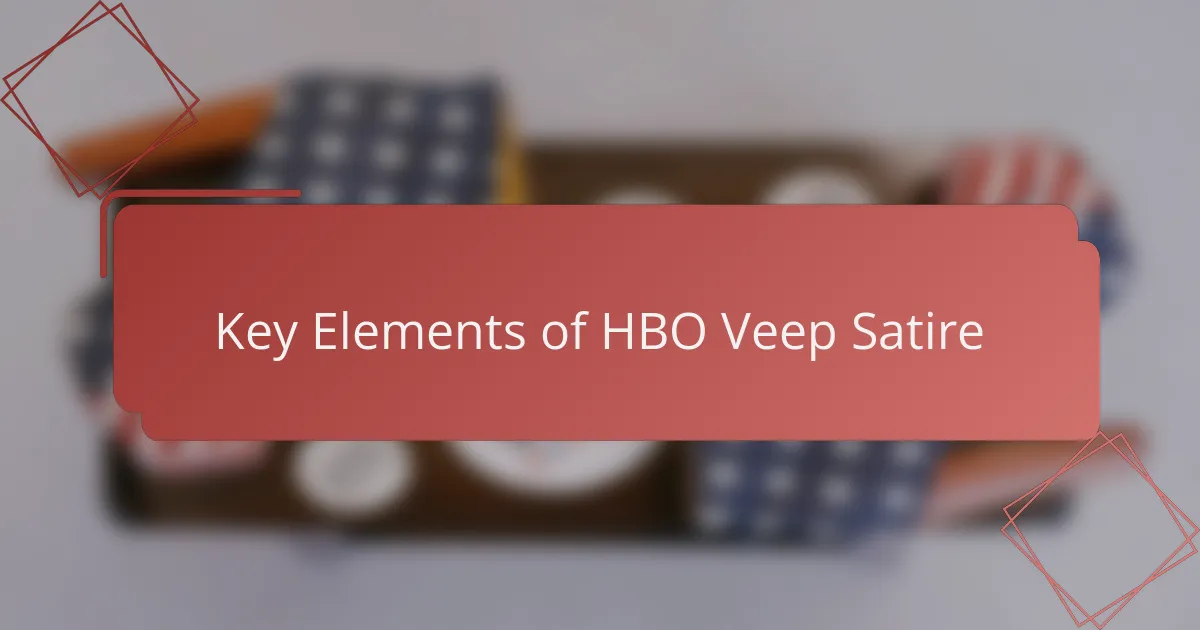
Key Elements of HBO Veep Satire
HBO’s Veep uses sharp wit and biting dialogue to expose the absurdity of political life. The show’s satire thrives on the relentless incompetence and self-interest of its characters, which often left me reflecting on how real politics can sometimes feel just as chaotic and petty. What struck me most was how Veep blends humor with a raw depiction of political ambition, making the satire both hilarious and painfully relatable.
| Key Element | Veep’s Approach |
|---|---|
| Characterization | Exaggerated flaws and self-serving politicians highlight the ridiculousness of political personas. |
| Dialogue | Fast-paced, razor-sharp exchanges that reveal the cutthroat nature of political maneuvering. |
| Themes | Power struggles, ambition, and the disconnect between political ideals and reality. |
| Tone | Darkly comedic with an undercurrent of cynicism about government inefficiency and ego. |
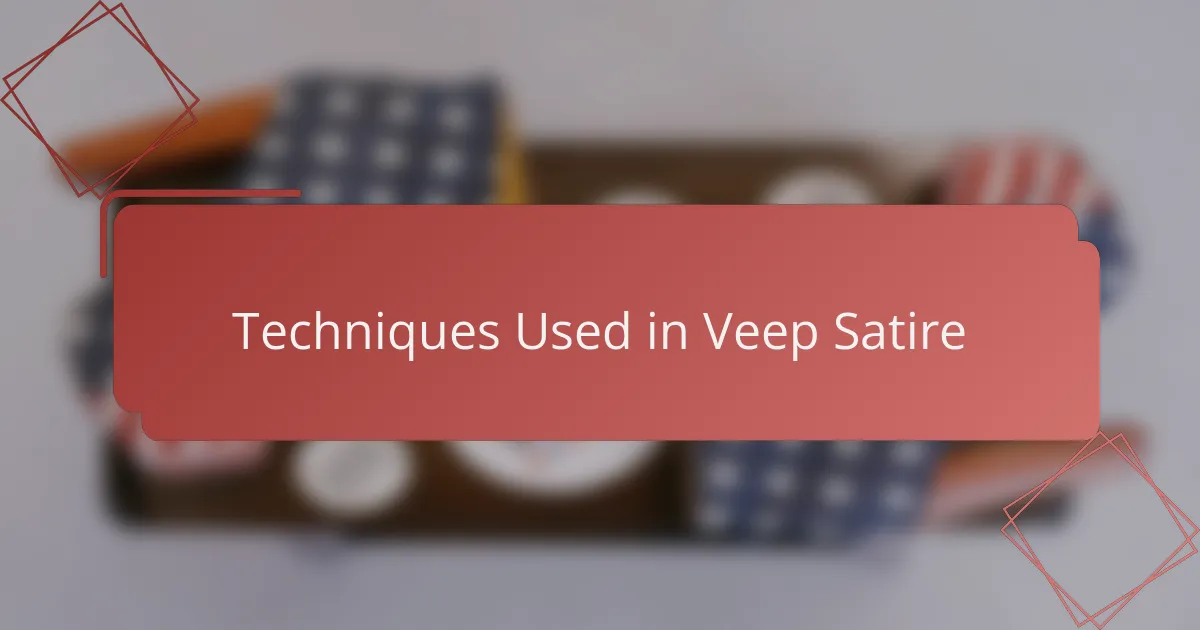
Techniques Used in Veep Satire
One technique that immediately caught my attention in Veep is its rapid-fire dialogue. The characters exchange biting remarks and sarcastic quips at such a dizzying pace that you almost feel like you’re eavesdropping on a high-stakes political war room. Have you ever noticed how this style keeps you on the edge, making the satire not just funny but intensely real? From my experience, this fast-paced banter brilliantly captures the chaotic energy of politics.
Another technique that stood out is the show’s clever use of exaggeration. Characters are portrayed with blatantly inflated flaws—who else but Veep could create a political figure so utterly self-absorbed and inept yet somehow believable? This exaggeration doesn’t feel like pure fantasy; instead, it magnifies traits we’ve all seen glimpses of in real politicians, inviting us to laugh while also wince. It’s this delicate balance between truth and inflation that I find so effective.
Lastly, the tone of Veep has a subtle but powerful cynicism running beneath its humor. Watching it, I often felt a mix of amusement and frustration, as if the show was inviting me to question the efficiency of political systems and the egos that run them. That darker undercurrent adds layers to the satire, making it not only entertaining but also thought-provoking. Doesn’t that blend of cynicism and comedy prompt you to look more critically at politics in your own life? That’s exactly what good satire should do.
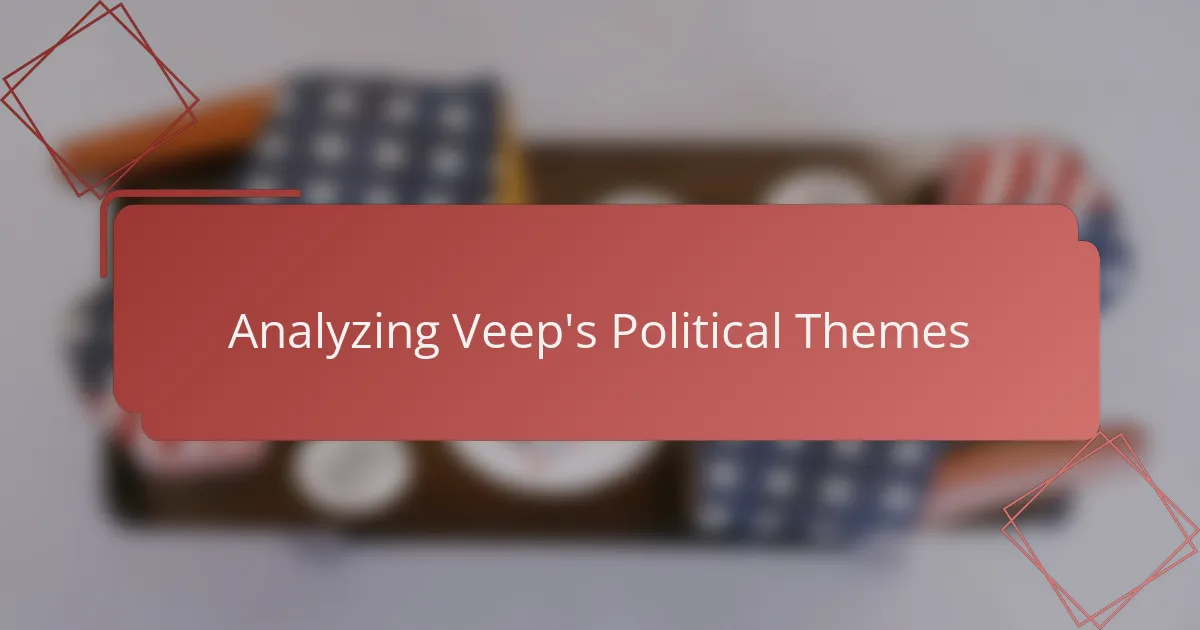
Analyzing Veep’s Political Themes
Veep strikes me as a razor-sharp portrayal of the chaos behind the scenes in American politics. Its themes dig into the absurdity of power struggles, ego clashes, and the hollow nature of political promises. From my experience, watching the show felt like holding up a magnifying glass to the dysfunction I’ve observed in real-world politics—it’s funny, but also a little unsettling.
| Theme | Veep’s Portrayal |
|---|---|
| Political Ambition | Relentless, often petty maneuvering for influence, showing the personal cost and absurdity behind public ambition |
| Power Dynamics | Highlighting constantly shifting alliances and betrayals, reflecting the instability and fragility within political hierarchies |
| Media Manipulation | Exposes how politicians prioritize image over substance, demonstrating the superficial nature of political communication |
| Policy vs. Ego | Focuses more on personalities than policies, suggesting that ego often trumps meaningful governance |
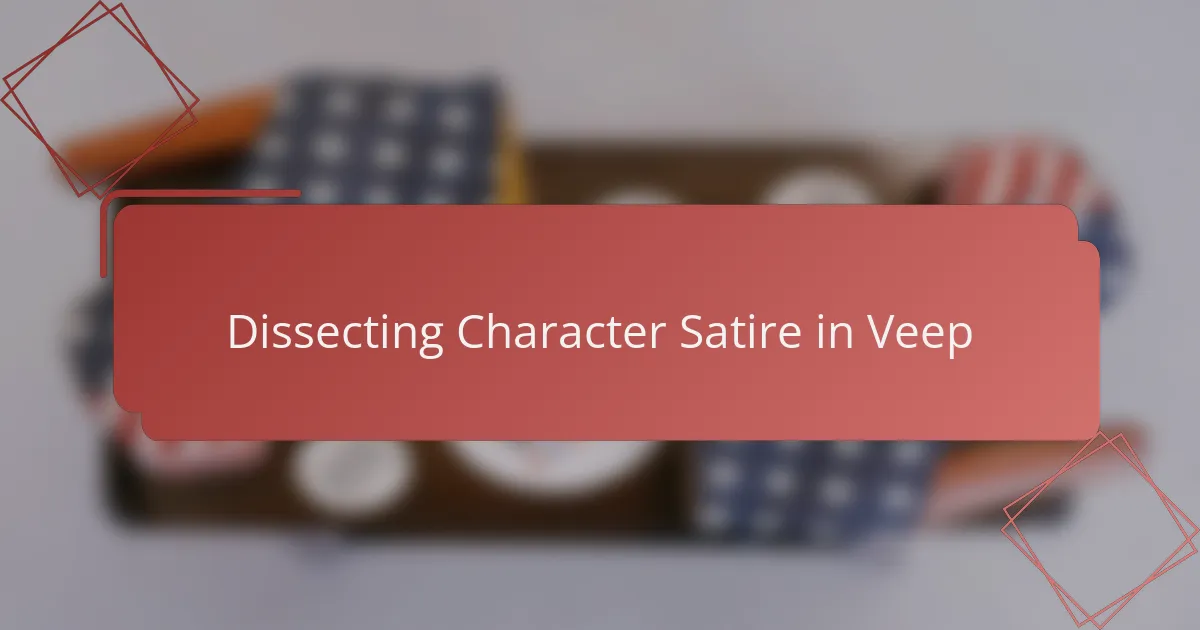
Dissecting Character Satire in Veep
When I first started looking closely at Veep’s characters, it was clear to me that their exaggerated flaws were the heart of its satire. Take Selina Meyer—her combination of ambition and cluelessness isn’t just for laughs; it feels like the show’s way of holding up a funhouse mirror to politicians who prioritize image over substance. Have you noticed how her narcissism and constant scrambling reveal the emptiness beneath political posturing? That’s the kind of character satire that makes me both chuckle and wince at the same time.
What fascinates me, too, is how the supporting cast amplifies the satire through their own ridiculous quirks. I remember the way Jonah’s desperation and awkwardness cranked up the cringe factor while spotlighting the desperation often lurking in political staffers. These character traits aren’t randomly absurd; they’re carefully exaggerated to expose real patterns of behavior and power plays in politics. It’s almost like watching a caricature, but one that’s drawn from surprisingly close observation.
And here’s a thought: by focusing so sharply on the foibles and failures of individual characters, Veep forces us to rethink the people behind the political machine. Watching their petty rivalries and self-serving antics, I couldn’t help wondering—how much of this chaos is just human nature, and how much is the system broken? That’s the genius of the show’s character satire—it dives deep enough to entertain but also nudges us to question politics in a way few comedies dare to.
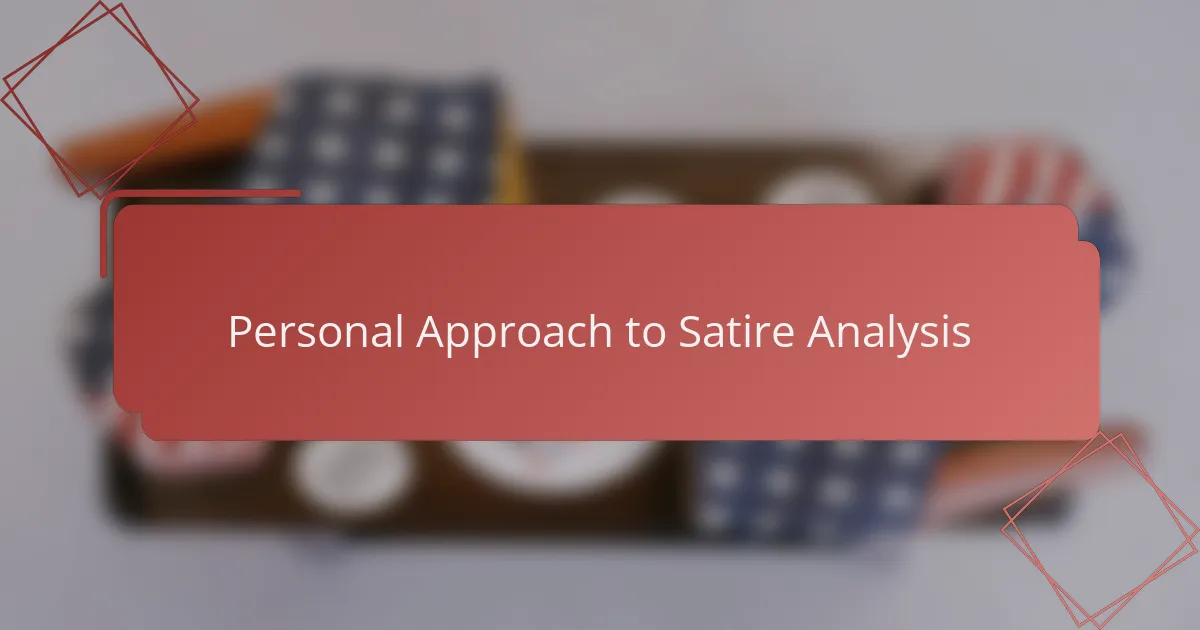
Personal Approach to Satire Analysis
When I approach satire analysis, especially with a show like Veep, I always remind myself to embrace both humor and critical thinking. It’s tempting to just laugh at the absurdity, but I find the real insight comes when I pause to unpack what those jokes say about political realities. Have you ever caught yourself laughing—and then suddenly realizing the satire hits a bit too close to truth? That moment is where I dive deeper.
I tend to dissect scenes by connecting them with my own experiences or observations of politics. For example, watching characters scramble to spin a fiasco reminds me of real-life crises management blunders I’ve seen or heard about. This personal connection not only makes the analysis more vivid but also keeps me emotionally engaged, turning satire from distant commentary into something immediate and relatable.
Sometimes, I even jot down specific lines or moments that jar me emotionally—whether it’s frustration, amusement, or disbelief—and then ask myself why they resonate so strongly. What does this reveal about power or human nature? This inquisitive, almost conversational approach keeps the analysis fresh and grounded, ensuring it’s not just academic but genuinely insightful.
